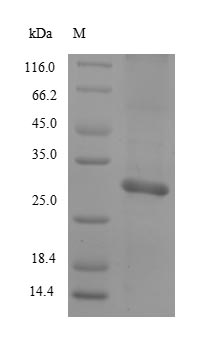Amino acids 21-247 form the expressed segment for recombinant Rat Mcpt2. The expected molecular weight for the Mcpt2 protein is calculated to be 30.5 kDa. Expression of this Mcpt2 protein is conducted in e.coli. The N-terminal 6xHis tag and C-terminal Myc tag was smoothly integrated into the coding gene of Mcpt2, which enables a simple process of detecting and purifying the Mcpt2 recombinant protein in the following steps.
Mast cell protease 2 (Mcpt2) is an enzyme belonging to the mast cell protease family, specifically the tryptase subgroup. In rats, Mcpt2 is primarily expressed in mast cells, which are immune cells involved in inflammatory and allergic responses. Mcpt2 functions as a serine protease and is stored in mast cell granules. Upon activation of mast cells, Mcpt2 is released into the surrounding tissues where it can contribute to various physiological processes, including inflammation, tissue remodeling, and defense against pathogens. Mcpt2 is implicated in allergic reactions and immune responses. Studying Mcpt2 and related mast cell proteases is essential for understanding the intricacies of mast cell function, immune regulation, and the development of therapeutic strategies for allergic and inflammatory disorders in which mast cells play a role.




